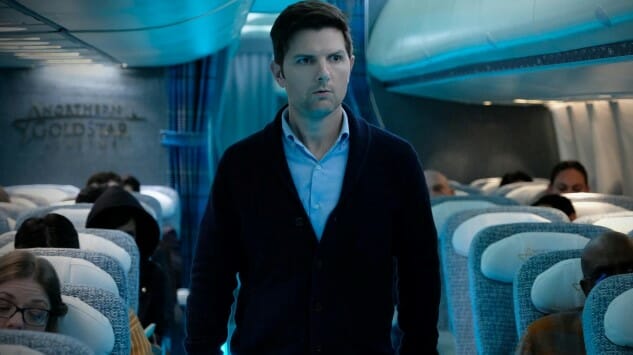“Nightmare at 30,000 Feet” Is a Competent but Dissatisfyingly Simple Return to The Twilight Zone
Photos via CBS All Access
There’s no denying that the task of even approaching a television monolith like Rod Serling’s The Twilight Zone is an almost unwinnable proposition. For all the praise heaped on Black Mirror over the years as an heir apparent to the Twilight Zone formula, the scrutiny would have been that much more intense if it actually bore the Twilight Zone name and iconic theme music. Jordan Peele’s reboot of the show carries the incalculable weight of millions of sci-fi fans’ expectations on its shoulders. Count us among those fans, and look no further than our recent ranking of all 156 original Twilight Zone episodes as proof.
Black Mirror is not The Twilight Zone, though, despite the constant comparisons. Episodes of Black Mirror ground themselves in the reality of established rulesets and settings. They conjure possible futures we’ve arrived at as a species thanks to some kind of technological development and explore the consequences of that development. Twilight Zone episodes, on the other hand, have a greater tendency to play out like morality playlets with elements of the supernatural and inexplicable. When Telly Savalas was stalked by his daughter’s “Talky Tina” doll in 1963’s “Living Doll,” it wasn’t because Serling was trying to make a commentary on consumer culture and the high-tech toys we surround ourselves with to distract from the real world. Rather, it was an exploration of Savalas character—a judgement upon an unloving man, meted out by the mysterious arbiters of the universe who reside in The Twilight Zone. Which is to say: Twilight Zone episodes aren’t always bound by reason and internal logic. It’s a convention that can be wondrous. It can also be frustrating.
So it is with “Nightmare at 30,000 Feet,” the first episode of CBS All Access’ new Twilight Zone reboot, executive produced and hosted by Peele. Like Serling, Peele is the marquee name attached to the project, although in this case it seems misguided to assign either credit or blame to him for any given episode. After all, unlike Serling, he didn’t direct any of the series first four episodes. Neither did he write them. In fact, it’s hard to say exactly what Peele’s primary contribution to this series really is, besides obviously enjoying his capacity as narrator. He does a fine job, in that duty. Regardless, it doesn’t seem like Peele will be entirely deserving of all the praise or the scapegoating this series will generate.
This premiere was in fact directed by prolific TV director Greg Yaitanes and written by Glen Morgan & Marco Ramirez, as an update to the very well-remembered TZ classic “Nightmare at 20,000 Feet,” which originally starred William Shatner as a man freaking out about a gremlin on the wing of his plane. The same story was faithfully updated for modern horror audiences in 1983’s Twilight Zone feature film, with John Lithgow stepping in for Shatner. This time around it’s Adam Scott’s turn to descend into panic, although gone is the literal gremlin ripping at the engines, aside from one clever cameo. Instead, Scott’s character is slowly driven toward apprehension and outright panic by a mysterious true crime podcast that purports to investigate exactly how the flight he’s currently on will disappear forever. The podcaster’s name? “Rodman Edwards,” the birth name and middle name of one Rod Serling. It’s a nice meta touch, in a premiere that otherwise can’t quite live up to its mythological pedigree.
It’s not for Scott’s lack of engagement, as the Parks and Rec veteran is well cast as a surprisingly pleasant, well-meaning, literate but anxious guy whose curse is that he keeps thinking he’ll be able to take a step back, breathe deep and straighten out the situation. Unlike so many Twilight Zone protagonists, Scott’s character isn’t explicitly a cad who is about to be served divine justice. Instead, he’s a guy with an overinflated sense of responsibility and capability, possibly as an overcompensation for some form of PTSD. Because really: Most human beings would react to a podcast like the one he listens to by just dismissing it outright, or having a panic attack in their chair. Scott, on the other hand, is the kind of guy who thinks there’s no reason he shouldn’t be able to save the day by virtue of being an intelligent, adult white male, which is of course his undoing.
-

-

-

-

-

-

-

-

-

-

-

-

-

-

-

-

-

-

-

-

-

-

-

-

-

-

-

-

-

-

-

-

-

-

-

-

-

-

-

-








































